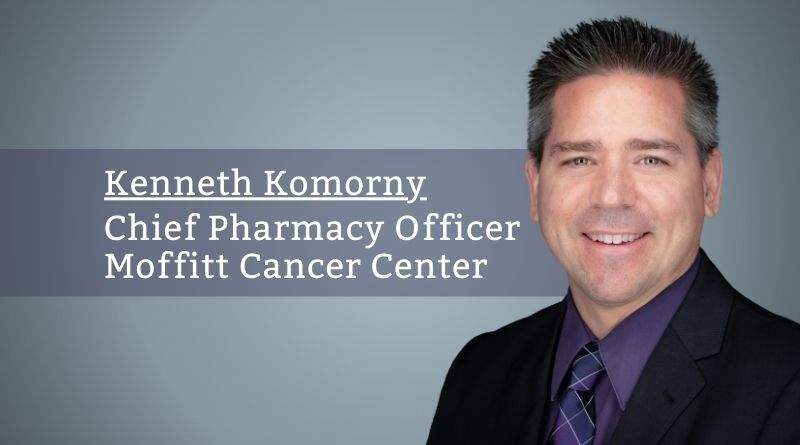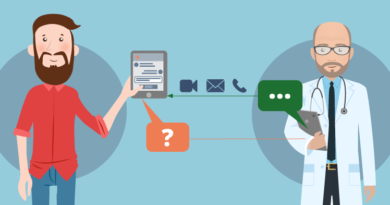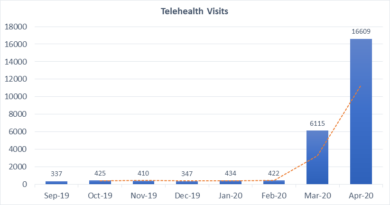Expansion of Pharmacy Services via Telehealth During a Global Pandemic
By Kenneth Komorny, PharmD, BCPS, Chief Pharmacy Officer, Moffitt Cancer Center
Last year, the world endured a global pandemic that terrorized human lives like never before seen in modern times. The deaths associated with or caused by COVID-19 led to a sense of fear and worry that remains unprecedented. Families, communities, states, and nations navigated this disease, and different approaches were taken to mitigate the complications. With no playbook to manage this disease, some approaches succeeded and some failed.
This pandemic was the quintessential disrupter. Many aspects of what we considered normal were turned upside down, and this epic disturbance caused many significant changes to standard processes and procedures. Businesses were either shut down or needed to provide services in a way that they never or rarely provided previously. This held true for health care as well.
Data has emerged that patients in the United States were not seeking health care, especially during the initial peak of this pandemic. The Centers for Disease Control and Prevention reported between the start of the pandemic through June 30, 2020, an estimated 41% of adults delayed or avoided medical care, including urgent/emergent and routine care. This avoidance was higher in patients with pre-existing medical conditions. The Health Care Cost Institute demonstrated peak decreases in childhood immunizations (60%), colonoscopies (90%), pap smears (80%), and mammograms (75%) between March and May 2020. Insurance data demonstrated 1 million fewer mammograms, colorectal and cervical cancer screenings in the first eight months of 2020. Data is also evolving that breast cancer is being diagnosed at an advanced stage.
Fear of the virus was impacting patients’ decision-making around other health conditions, and arguably more deadly health conditions. Therefore, we needed to adapt and determine how we could reach these patients that were potentially negatively impacting their overall health care.
Moffitt Cancer Center has a unique clinical pharmacy practice that provides direct clinical pharmacy care to patients in each of our 14 different multi-disciplinary specialty clinics.
Moffitt Cancer Center is dedicated to one lifesaving mission: contributing to the prevention and cure of cancer. The Tampa-based facility is one of only 51 National Cancer Institute-designated Comprehensive Cancer Centers, a distinction that recognizes Moffitt’s scientific excellence, multidisciplinary research, and robust training and education. Moffitt is the No. 11 cancer hospital and has been nationally ranked by U.S. News & World Report since 1999.
The cancer center has a unique clinical pharmacy practice that provides direct clinical pharmacy care to patients in 14 different multidisciplinary specialty clinics. Patients can see their cancer provider in conjunction with nursing and our pharmacy specialists. Many of our clinical pharmacy specialists provide comprehensive chemotherapy and targeted therapy education and medication management as part of their care in these clinics.
At the advent of the COVID-19 pandemic, our specialists were growing their clinical services by providing clinical pharmacist appointments within the clinic. Because of the pandemic and nationwide lockdowns, many of our patients were no longer coming in person to appointments. Although COVID-19 had many negative impacts on our patients and access to care, we were able to quickly increase the number of virtual visits. The overall number of virtual Zoom visits at Moffitt increased exponentially by 5,000%. By this virtual platform, our patients could continue to receive the care that they needed.
This was also true for the pharmacy as we provided access to our clinical pharmacists by developing virtual health appointments for our patients. Patients now have the opportunity to visit with our team, determine a diagnosis and treatment plan. Once a plan is developed, they can meet virtually with our pharmacist in the convenience of their home to review the treatment plan, supportive medications, and chronic medications to provide a comprehensive pharmacy review prior to starting treatment. As a virtual offering, patients are not limited to having one additional caregiver or loved one on-site but can have multiple join them on their appointment.
As a result of this program, we have been able to increase our number of overall clinical pharmacist appointments. We schedule according to the patients’ calendar and have also been able to level these appointments within the pharmacists’ schedule, which allows our pharmacists to see more patients. In the first three months of the pilot, we were able to educate about 100 head and neck patients virtually. In addition, we have seen significant improvements in our patient satisfaction scores and overall comprehension of the treatment plan. Our team is able to optimize supportive care medications and mitigate potential drug interactions. As we continue to expand this program for our patients, we plan to track our patient satisfaction scores, medication interventions completed through these visits, as well as track the number of completed appointments over time. We are also exploring an expansion of this service to bill for medication therapy management and practice agreement to assist with toxicity and supportive care as an extension of the clinical team.
The pandemic has caused devastation and many disruptions in all aspects of our lives. The impact of non-COVID-19 health outcomes is significant as well. Our virtual pharmacist-driven patient medication education program at Moffitt Cancer Center is a good and creative example of how care could be alternatively provided, and health outcomes could be improved using technology during a time when overall health care by traditional means was abandoned.



